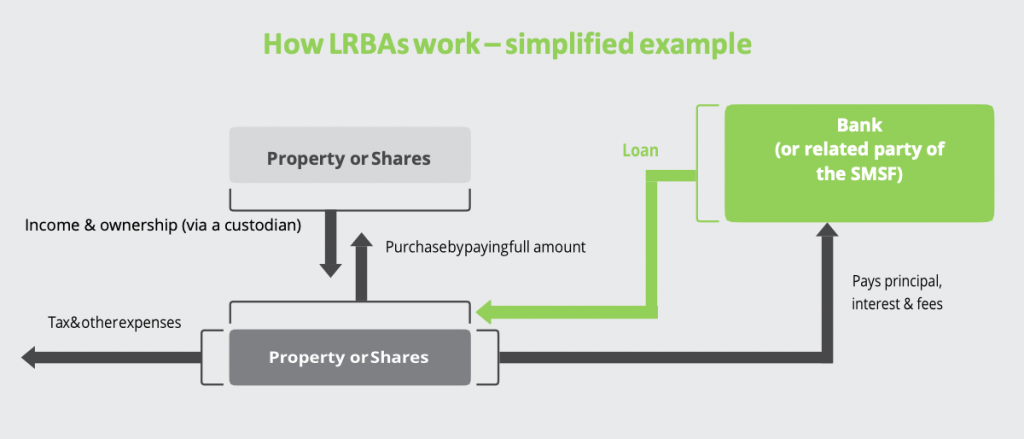resources
Borrowing in a Self-Managed Super Fund?
What are the rules?
Self-Managed Super Funds (SMSF) are allowed to borrow to invest in direct property, managed funds or shares as long as a Limited Recourse Borrowing Arrangement is used for the transaction.
What is a Limited Recourse Borrowing Arrangement (LRBA)?
An LRBA is a financial arrangement which enables an SMSF to purchase property or shares with borrowed money. It is limited recourse because if the trustee defaults on the loan, the lender’s recourse is generally limited to the asset acquired which protects the value of the other assets of the fund.
Trustees are able to borrow from related parties of the fund including its members or from lending institutions. If borrowing from a related party specific rules need to be followed to ensure the loan is on commercial terms.
Since an SMSF cannot own an asset directly that is geared, the asset must be held on trust until the loan is repaid. A bare trust is established to hold the asset as custodian but the SMSF has full beneficial interest in that property or shares, and as a result will receive all rent paid by the tenants or dividends generated by the shares.
Your SMSF trustee pays interest on the loan and fees to the lender. In the case of a property it also pays for repairs, maintenance, and property management expenses. These costs may be deductible to the fund.
One of the main attractions of borrowing to purchase shares or property within an SMSF is that capital gains are concessionally taxed. For example, a capital gain on a property held for longer than 12 months is taxed at only 10%, and in retirement pension phase any capital gains are tax free.
What are the options at the end of the term?
Borrowings are typically from 1-20 years. The SMSF has the option to:
• repay the loan and acquire full ownership of the asset, or
• sell the asset during the term – with the proceeds applied to the outstanding loan and other associated costs, with any leftover going to the SMSF.
Who should use LRBAs?
LRBAs will suit those members of SMSFs who meet one or both of these criteria:
• need to build their retirement savings faster, or
• would like to hold a key property inside the low tax super environment (e.g. their business premises).

Important things to consider
Borrowing inside SMSF is not a simple process and professional advice is required.
Some points you need to be aware of include:
a SMSF can only invest in assets which meet SIS regulations
SMSF can only borrow to acquire assets if the trust deed allows, which may require a review of the SMSF trust deed and investment strategy, and
You will also need to establish a security custodian (bare trust) to facilitate the acquisition.
Borrowed funds do not count towards contribution caps, and
The loan used to purchase the asset can only be a limited recourse loan – which means the lender generally has no claim on any other assets in the SMSF other than the asset purchased with their funds. The lender may require security over assets outside of your SMSF using personal guarantees
Pros
- Your SMSF has more money invested than if it hadn’t borrowed and therefore could potentially benefit from higher investment income and capital growth
- Investment income is taxed at 15% maximum (compared to up to 45% outside of superannuation)
- Capital gains tax is 15% maximum (compared to up to 45% outside of superannuation) with a one-third discount if held 12 months or more
- The asset is fully protected from future litigation & bankruptcy you or your business may face (as long as it was not placed in your SMSF for protection against a specific litigation or bankruptcy you were aware of).
Cons
Increased level of risk due to borrowed investment funds.
The cost of borrowing is deductible at 15% (compared to up to 45% if borrowing outside of superannuation)
Additional administration is required for SMSF trustees
There is a cost to set up a limited recourse borrowing arrangement and the bare trust
Possible additional costs and tax consequences if asset is sold prior to full repayment of lo
Any advice in this document is general advice only and does not take into account the objectives, financial situation or needs of any particular person. You should obtain financial advice relevant to your circumstances before making investment decisions. Where a particular financial product is mentioned you should consider the Product Disclosure Statement before making any decisions in relation to the product. Whilst every care has been taken in the preparation of this information, Australian Unity Personal Financial Services Ltd does not guarantee the accuracy or completeness of the information. Australian Unity Personal Financial Services Ltd does not guarantee any particular outcome or future performance. Australian Unity Personal Financial Services Ltd is not a registered tax agent. If you intend to rely on any tax advice in this document you should seek advice from a registered tax agent. Australian Unity Personal Financial Services Ltd ABN 26 098 725 145, AFSL & Australian Credit Licence No. 234459, 114 Albert Road, South Melbourne, VIC 3205. This document produced in November 2013. © Copyright 2013.



